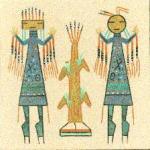 (Article is by guest writer Ed Kelly Jr. For a brief bio, see below.)
(Article is by guest writer Ed Kelly Jr. For a brief bio, see below.)
At a recent lecture I gave on my journey out of Fundamentalist Pentecostalism and my awareness and subsequent changing of my heteronormative and racist views, someone afterwards remarked that much of what I was advocating sounded like Buddhist principles. Well, I was intrigued and began reviewing my lecture notes and Buddhism. The title of my lecture was Racism, paideia, personal transformation, and activism.(1) The thesis of the lecture was if you want to see change in the world – be that change, begin with your thinking – and as your thinking changes your behavior will change and that change will influence others. I shared how my life changed by the process of paideia: a continuous practice of self- examination which made me aware of the many misperceptions in my life. Socrates exemplified this process when he wrote: “the unexamined life is not worth living.” In the original Greek it reads:
“The life that cannot stand up to rigorous examination – rigorous questioning – is not worth living for a human being.”
My life changed as I began to continuously question my theological box, to see if my ideas matched reality or were reasonable. My emphasis in the lecture was that paideia is not a momentary event but a lifelong endeavor. I also could have used Buddha as an example of this process. Buddha taught:
“Do not believe in anything simply because you have heard it. Do not believe in anything simply because it is spoken and rumored by many. Do not believe in anything simply because it is found written in your religious books. Do not believe in anything merely on the authority of your teachers and elders. Do not believe in traditions because they have been handed down for many generations. But after observation and analysis, when you find that anything agrees with reason and is conducive to the good and benefit of one and all, then accept it and live up to it.”(2)
This is paideia, continuously laboring over your ideas – “transforming your heart and mind through introspection.”(3) Buddha used the image of an ox struggling to get out of deep mud using a steady persistent effort in pursuit of the goal, which is liberation from our errors in thinking and passions.
I used the term “awoke” in my lecture. Now I realize the controversy of using this term and drawing an analogy to Buddha but bear with me. It is the best term to describe my enlightenment, that is, my change in thinking and behavior. When people asked Buddha, “Are you a god? An angel?” His answer was “I am Buddha!” Literally “buddha” means “I am awake.” By that term, he meant that he was able to see the world or reality as it is without bias or clouded perception. It is in that limited sense, that I use the term “awoke” with reference to the awareness of how I was hurting others by my beliefs and subsequent behaviors rooted in my ignorance and misperceptions. It was like I was blind to the way I was treating people. Hell, I was blind; totally blinded by my conditioning as a Fundamentalist Pentecostal minister. I became aware of my white male social lens which conditioned me, distorting my perceptions, and blinding me to effects of systemic racism and heteronormative patriarchalism. I became aware of the suffering I had inflicted on people by my beliefs.
I woke up to how I had assaulted people of color with my words and actions; my microaggressions or short snippets of indignity that I communicated to them. One that that I commonly used in dialogues and even from the pulpit was: “When I look at you, I don’t see color.” In other words, I was denying this person’s ethnic experience as a person of color. Another one was “Everyone can succeed in America, if they work hard enough,” not realizing it was implying that people of color were lazy and needed to work harder. As a Pastor, I spoke out against affirmative action from the pulpit saying things like “the most qualified person should get the job” implying that people of color were given unfair benefits because of their race. While these were unintentional, it still hurt people.
I also woke up to how I had viciously targeted the LGBT community. This was not an unintentional assault; it was intentional homophobic aggression. I had gone out of my way in my preaching and in my civic conversations to not only disapprove of the LGBT experience but also declaring that it was contrary to Natural-Biblical law, sinful, pathological, and criminal. I wrote and spoke against gay marriage and supported legislation for active discrimination against the LGBT community.
I woke up – that is, I became aware of the suffering I had inflicted on people because of my misperceptions of what was “truth.”
Years ago, I heard a Buddhist teacher say: “All meaningful and lasting change starts on the inside and works its way out.” I believe inner-outer work can help solve the current racial-heteronormative crisis in this country. If I understand Buddhism, a central focus is on suffering or dukkha and much of our suffering is due to misperceptions and ignorance. Buddha’s solution is a daily practice of the Eightfold Path. The first two practices are crucial: right view and right thinking. Both deal with misperceptions.
Right view is “the ability to distinguish wholesome roots from unwholesome roots…” and “the practice of mindfulness helps identify all the seeds in our stored consciousness and water the ones that are the most wholesome.” “Right thinking is thinking that is in accord with right view. It is the map that can help us find our way.”(4)
Thinking is so important because everything follows from it or as King Solomon said: “As a man thinketh, so is he.”(5) I discovered that my mind was full of preconceived ideas, clouded by biases and false theological ideas. As I began to question these ideas, I found true repentance – a word mistranslated in the King James version of the Bible. It means to change your thinking. As I changed my thinking, my behavior changed.
I am not so naïve to believe that just working to change myself is enough to change this nation, but it will influence many! As Mother Teresa explained “I alone cannot change the world, but I can cast a stone across the waters to create many ripples…” In other words, I can change myself and influence others.
(It is my hope that this article will open the doors for frank dialogue on applying the teaching of Buddha to our society’s racial and heteronormative misperceptions.)
Subscribe to The Spiritual Naturalist Society
Learn about Membership in the Spiritual Naturalist Society
__________
The Spiritual Naturalist Society works to spread awareness of spiritual naturalism as a way of life, develop its thought and practice, and help bring together like-minded practitioners in fellowship.
Notes:
- If you are interested in reading a transcription of the lecture, you can find it on the Bleeding heartland blog: https://www.bleedingheartland.com/author/edwkelljr/
- E.A. Burtt, The Teachings of the Compassionate Buddha. New York: Mentor Books. 1955.
- Dalai Lama, Transforming the Mind. London: Thorson, 2000, pg.
- Thich Nhat Hanh, The Heart of Buddha’s Teaching. New York: Harmony, 2015 pg., 51,63.
- Proverbs 23:7 KJV
BIO: Guest writer Edward Kelly Jr. lives in Red Oak, Iowa, with his wife Rose. He was a Fundamentalist Pentecostal preacher for 20 years and in 1995 began a journey out of fundamentalism through the influence of such writers as Paul Tillich and James Barr. He has a Masters in Theology from Franciscan University (Steubenville, Ohio) and is a member of the 1st Unitarian Church in Omaha Nebraska.













